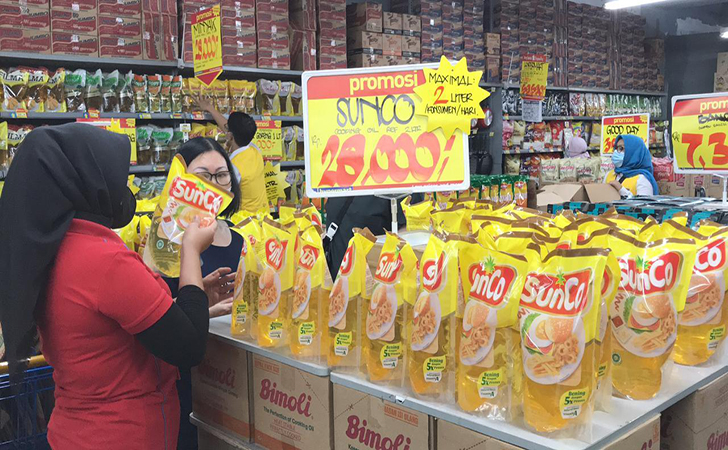
STRATEGIC ASSESSMENT. Jakarta. The latest IPCC report recommends that we need to cut greenhouse gasses emission hard and fast as the Earth continues to warm causing more frequent and severe weather and threatening the lives of Earth’s inhabitants. One of the major cuts should come from the energy sector.
As fossil fuel combustion and industrial processes accounted for 78% of greenhouse gas emissions, rapid transition from fossil energy to cleaner energy is more important than ever. Countries worldwide have embarked on various initiatives to encourage the development of clean energy. The latest move in this green initiative involves religious leaders promoting fossil fuel transition.
Finance Minister Sri Mulyani Indrawati has proposed to the House of Representatives a massive increase in subsidies and compensation as the government seeks to keep fuel and electricity cheap despite a global energy price surge.
The move, announced on Thursday afternoon, would raise budget allocations for energy subsidies and compensation by nearly IDR291 trillion ($19.83 billion) to IDR 443 trillion, far above the figure stated in the budget plan for this year.
Indonesia’s parliament approved a government request to boost energy subsidies by about $23.8 billion to be able to keep some energy prices unchanged amid a global surge in inflation. Additional energy subsidies worth IDR74.9 trillion ($5.09 billion) were approved, as was additional compensation of IDR275 trillion for state energy firm Pertamina and utility PLN.
Indonesia said yesterday that it will lift a ban on palm oil exports that has played havoc with global edible oil markets, citing improvements in the domestic supply of cooking oil. The announcement was made by President Joko “Jokowi” Widodo in a press conference yesterday, at which he said that the exports would be permitted to resume next week, the Associated Press reported.
“Based on the current supply and price of cooking oil and considering that there are 17 million workers in the palm oil industry, both working farmers and other supporting staff, I have decided that the export of cooking oil will reopen on Monday, May 23,” Jokowi said, according to the AP report.
Jokowi’s administration imposed the ban in late April, in a bid to control the soaring domestic cost of cooking oil – a potential political liability – after subsidies, export permits, and a palm oil levy had all failed to bring the cost down. The move by Indonesia, the world’s largest palm oil exporter, rocked global markets for edible oil, already hard-hit by the ongoing conflict in Ukraine, which has tightened supply of sunflower oil. In the aftermath of the export restriction, the global price of palm oil spiked by more than 200 percent.
Previously, hundreds of independent Indonesian farmers held protests across the nation to demand that the country end its strict ban on the export of palm oil and its derivatives, which they claim has adversely impacted their incomes.
The administration of President Joko “Jokowi” Widodo imposed the ban in late April, in order to control the soaring domestic cost of cooking oil, shaking global edible oil markets and costing exporters tens of millions of dollars. The ban covers shipments of crude palm oil and some of its derivative products from Indonesia, the world’s largest exporter of the ubiquitous and versatile oil.
According to a Reuters report on Tuesday’s protests, demonstrators in the capital Jakarta marched next to a truck piled with palm oil fruits. One of the signs held by protesters read, “Malaysian farmers are wearing full smiles, Indonesian farmers suffer” – a reference to the fact that the export ban has allowed Malaysia, the world’s second-largest palm oil exporter, to seize global palm oil market share from Indonesia.
President Jokowi said the government has decided to lift the export ban starting Monday (May 23), after seeing the current condition of supply and price of cooking oil which is getting better and sufficient, while considering workers and farmers in the palm oil industry as well. Jokowi said that since the ban on cooking oil exports was in effect, the government has continued to monitor and encourage various steps to ensure the availability of cooking oil to meet the needs of the community.
The government did not admit it but the policy by and large failed to stabilize the price of bulk cooking oil price at the fixed price ceiling of IDR14,000 (96 cents) per liter, which is half of the free market price. The antimarket measure had instead inflicted devastating impacts on the palm oil industry, caused major losses in government revenues and export earnings and cut farmers’ income by 50 to 70 percent and adversely affected millions of workers.
Many analysts, oil palm farmers associations and even businesspeople also agree that the government should intervene to stabilize the skyrocketing price of palm oil, which was caused by the global edible oil crisis. They even urged the government to reimpose the domestic market obligation (DMO) on palm oil producers, amounting to 30 percent of their export volume, like the one imposed on coal producers. The most qualified institution for this job is the State Logistics Agency (Bulog).
Investment Minister Bahlil Lahadalia on Wednesday assured that the government would ban the export of bauxite and tin this year as part of the government’s effort to develop the domestic downstream mineral industry and raise the added value of mining commodities.
Bahlil said Indonesia’s export ban on nickel ores had been proven effective to boost the export of one of the commodity’s derivative products, which is stainless steel. In addition, said Bahlil, the export ban on raw mining and mineral commodities also brings positive impacts to the trade balance, especially with China. The minister added that after nickel and tin, Indonesia will also stop exporting bauxite in raw form.
Indonesia is the world’s largest palm oil producer. On 28 April 2022, the government ordered an export ban designed to address domestic cooking oil shortages and reduce food prices. The policy extends to crude oil and refined products, and is expected to last until the price of cooking oil dips below Rp 14,000 (US$1) per litre.
This decision comes as a shock to the market amid fears that the ban will worsen global food inflation, adding uncertainty to a market that has already suffered massive price swings. The policy resembles the coal commodities export ban of January 2022, when the government stopped coal exports due to reduced domestic supply.
The prices of these two commodities have increased globally, but the Indonesian government wants them to stay low. The large gap between the domestic price and the astronomical prices companies can receive from international markets has incentivised these companies to export palm oil.
National Police’s Criminal Investigation Agency Chief Agus Andrianto on Wednesday said the alleged smuggling of cooking oil and its raw materials intensified after the ban, as it drove entrepreneurs to seek more profit by selling palm oil products abroad. People’s Coalition for Food Sovereignty representative Ayip Abdullah said the ban, and Indonesia’s status as one of the world’s largest palm oil producers, have increased prices abroad.
Oil palm smallholders plan to organize another street protest in Jakarta to further pressure the government to lift its palm oil export ban, after having organized a sizable protest on Tuesday. Indonesian Oil Palm Farmers Association (Apkasindo) Chair Gulat Manurung on Wednesday said if the ban was not reviewed within the near future, the organization had plans to bring one million palm kernels to the Hotel Indonesia traffic circle in Central Jakarta, where the kernels would be processed into red palm cooking oil then sold, as a form of protest.
Indonesia’s trade surplus reached a record high in April, surpassing the previous peak in October 2021, as soaring global commodity prices boosted exports. Statistics Indonesia (BPS) Chair Margo Yuwono on Tuesday said the value of Indonesia’s exports in April 2022 reached $27.32 billion, an increase of 3.11 percent and 47.76 percent compared to export performance in March 2022 and April 2021, respectively.
Margo said Indonesia’s year-to-April trade surplus totaled $16.89 billion, the highest since 2017. “Cumulatively, the value of Indonesia’s exports in January to April 2022 reached $93.47 billion, a 38.68 percent increase compared to the same period in 2021. Meanwhile, non-oil and gas exports reached $88.73 billion, a 39.12 percent increase,” said Margo. (Red/many sources)






